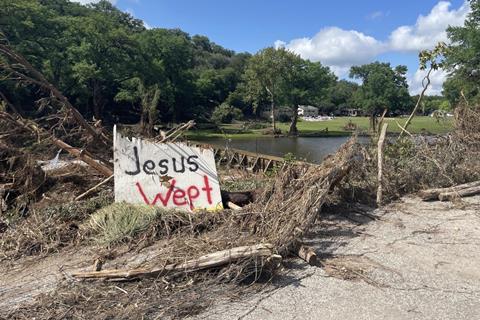Jeff Lucas has been shocked by the response from some Christians online to the tragedy of the Texas floods. Perhaps, before rushing towards the hope of resurrection, we might first make space for tears and questions

I have a love/hate relationship with social media - and Facebook specifically. It’s a quick and easy way to share information, catch up with distant friends or engage in discussion, especially when those keyboard warriors who like to yell are having a quiet day off. I don’t even mind those endless photos of beloved puppies, but my interest fades when folks insist on sharing snapshots of their breakfast, eggs and bacon resplendent so that the online world can watch in salivating wonder.
But in the last few days, I’ve been troubled by some posts that have been shared by well-meaning believers. Our hearts have ached over the tragedy of the Texas floods, where, as I write, over one hundred have perished and still more are unaccounted for.
We dash to triumph and insist that those who weep should too quickly dry their tears
The awfulness has been compounded by the deaths of dozens of little girls who were attending the Christian Camp Mystic. They gathered in the hope of summer fun and learning more about Jesus; we’ve wept at the sight of photos taken hours before the watery barrage swept them away, their carefree smiles unaware of the horrors to come.
Future hope
The online response has largely been a call to pray for those who are navigating unspeakable grief at the loss of their loved ones. But there have also been a few posts that have troubled me, pictures showing an image of Jesus, wading through the waters, picking up little ones wearing ‘Camp Mystic’ t shirts, folding them safely into his loving embrace.
I’ve don’t doubt the sincerity of those who have posted those images, but I must express gentle concern. The brutal fact is that Jesus did not rescue those children from the perilous waters, and the fact that a Christian camp was so devastated must surely trouble us all. We know that we live in a broken world, and that Christians young and old are not promised a free pass from suffering. But even if our apologetics are robust, our hearts still cry out as we ponder the torturous question: why could these bright young lives not have been spared? Why did Jesus not pluck those terrified campers from the furious flood?
Present pain
Surely wrestling with that question should be part of our grief. Of course, there will be some who will point us to the truth that, in the risen Jesus, we have resurrection hope, and that, gloriously, those happy go-lucky young campers are now safely home, present with the Lord. We are told to comfort one another with that truth. But I worry, lest we dash to triumph too quickly, and hastily insist that those who weep should too quickly dry their tears.
Some Christians view sadness as an enemy. I discovered this when preaching at a large church - one where breathless excitement was continuously required - and began to talk about my own journey through clinical depression. The confession that I had navigated emotional shadowlands as a Christian leader was, in their view, contradictory to their “We have Jesus now, and so we live in continual victory” message.
The brutal fact is that Jesus did not rescue those children from the perilous waters
I had previously been invited to speak there regularly, but suddenly the invitation dried up. Despite scripture being loaded with stories of people questioning God and sobbing in lament, confusion and despair, my desire to be authentic about sadness was unwelcome. Ironically, some of the leaders who so loudly professed unending joy privately told me of their own struggles.
I repeat again, lest any misunderstand: I have no condemnation for those who seek to bring comfort to the grieving with the reminder of our resurrection hope.
It is true that one day, all tears will be banished, wiped away forever. My request is simply that we remember, in the meantime, there is a time to laugh – and a time to weep also.






































1 Reader's comment